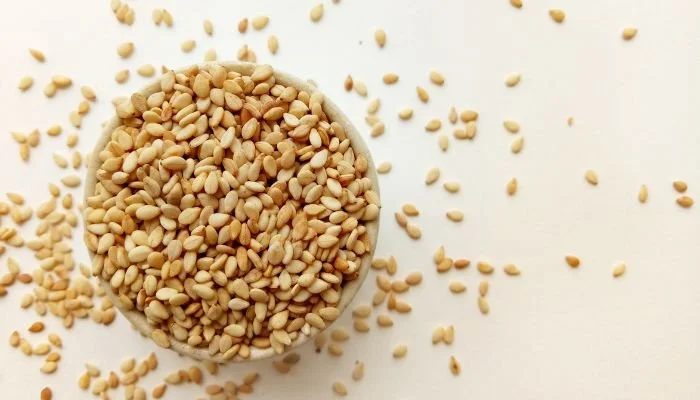Is That Safe? Eating Sesame Seeds During Pregnancy
Hey mamas, we had a couple of people reach out to us after we posted this Sesame Chicken Recipe wondering if they could eat sesame and sesame seeds during pregnancy! So we’re back with another installment of our Is That Safe series to answer: Is it safe to eat sesame seeds during pregnancy?
Is it safe to eat sesame during pregnancy?
It is generally safe to eat sesame during pregnancy unless you have a known allergy (more on that below!), which includes sesame seeds, oils, and butters.
Sesame seeds are tiny powerhouses of nutrition, packed with essential nutrients that can support you during pregnancy. These tiny seeds are a rich source of healthy fats, including omega-3 and omega-6 fatty acids, which are important for brain development and overall growth. Sesame seeds are also abundant in minerals such as calcium, iron, magnesium, and zinc, all of which play vital roles in maintaining the health of both mother and baby.
One of the primary concerns regarding sesame consumption during pregnancy is the potential for allergies. Sesame allergy is one of the most common allergies – around 1.1 million people in the US, an estimated 0.23% of the population, have a sesame allergy. Allergies occur when the immune system mistakenly identifies a harmless substance, such as sesame, as a threat, triggering an allergic reaction.
If you have a known sesame allergy, it is crucial to continue to avoid sesame seeds or any products containing sesame during pregnancy. In such cases, consuming sesame can lead to allergic symptoms such as hives, itching, swelling, or even anaphylaxis, which is a severe and potentially life-threatening allergic reaction.
If you are unsure about whether you have a sesame allergy or not, it is advisable to consult with an allergist before including sesame in your diet during pregnancy
Are there any benefits of eating sesame seeds during pregnancy?
While sesame allergy is a concern for some individuals, sesame seeds can offer various potential benefits during pregnancy. Here are some ways in which sesame can positively impact pregnancy:
Nutrient-rich: As mentioned earlier, sesame seeds are a great source of essential nutrients, including calcium, which is crucial for developing strong bones and teeth in both the mother and the baby. Iron is another essential nutrient present in sesame that helps prevent anemia, a condition sometimes developed during pregnancy.
Heart-healthy fats: Sesame seeds are abundant in monounsaturated and polyunsaturated fats, which are considered heart-healthy fats. These fats help in maintaining healthy cholesterol levels and promote cardiovascular well-being.
Fiber and digestive health: Sesame seeds are a good source of dietary fiber, which can help prevent constipation, a common issue faced during pregnancy. Adequate fiber intake promotes regular bowel movements and aids in overall digestive health.
What’s the difference between white & black sesame seeds? Which is better for you?
The difference between different colored sesame seeds lies primarily in their outer seed coat, which can vary in color from white to yellow, brown, or black. While the color variation may seem significant, there is minimal difference in terms of health benefits between different colored sesame seeds, and the nutrient composition, including healthy fats, minerals, and fiber, remains relatively consistent across different colors.
Here’s a quick guide to the different colors you may see on sesame seeds:
White sesame seeds: These are the most commonly available sesame seeds and are widely used in various culinary preparations. They have a mild, nutty flavor and are often used as toppings or in baked goods. Nutritionally, white sesame seeds are similar to other colored varieties, offering a good amount of healthy fats, minerals, and fiber.
Yellow sesame seeds: Yellow sesame seeds have a slightly deeper flavor compared to white sesame seeds. They are commonly used in Asian cuisine, particularly in Chinese and Korean dishes. Like white sesame seeds, they provide similar nutritional benefits.
Brown sesame seeds: Brown sesame seeds have a more robust and nuttier flavor compared to white or yellow seeds. They are often used in Middle Eastern cuisine and are popular in dishes such as hummus and tahini. Nutritionally, brown sesame seeds are comparable to other varieties.
Black sesame seeds: Black sesame seeds have a rich, earthy flavor and are commonly used in East Asian cuisines, particularly in Japanese and Chinese dishes. They are visually striking and often used as a garnish or in desserts. From a nutritional standpoint, black sesame seeds are similar to other colors and offer similar health benefits.
Incorporating sesame into your pregnancy diet
If you do not have a sesame allergy and would like to incorporate sesame into your pregnancy diet, there are various safe and delicious ways to do so. Here are a few suggestions:
Sesame butter: Opt for natural, unsweetened sesame butter, commonly known as tahini. Use it as a spread on whole-grain bread or as an ingredient in dips and dressings.
Sesame seeds as toppings: Sprinkle toasted sesame seeds on salads, yogurt, or stir-fried vegetables for added crunch and flavor.
Sesame oil: Use toasted sesame oil to add a rich, nutty flavor to your stir-fries, marinades, or salad dressings.
Try our sesame chicken recipe here!
The takeaway
Consuming sesame during pregnancy can be safe and beneficial for most expectant mothers. However, if you have a known sesame allergy, it is crucial to avoid sesame products to prevent potential allergic reactions. Sesame seeds offer a wealth of essential nutrients and heart-healthy fats, making them a valuable addition to a balanced pregnancy diet.
Have a question for us? Leave it in the comments!

